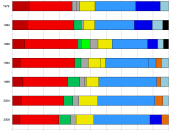At the eve of the 21st century, Europeans embarked on another extraordinary event: The European Union (EU) intended to unite the peoples of many diverse geographies and nations through its eastward enlargement. This round of enlargement, different from any earlier accession rounds in scope and diversity will increase EU population from 375 million to 550 million; will expand its territory by 34% and the number of its members will be nearly doubled from 15 to 28. Such an intensive and ambitious project has been formulated and implemented within the framework of EU, piece by piece; through a long line of complex intra-EU negotiations and interstate / inter-institutional bargaining processes. In this sense, the policy process towards Central and Eastern European Countries (CEECs) is a "composite policy" which incorporates multiple policy areas and various policy-makers at both "macro" and "meso-levels". Therefore, the determination of the agenda and speed of enlargement is part of a broad and complex policy process where relevant national policy-makers, the Council and the Commission interacted.
Germany, with strong interests in Eastern enlargement has only been one of those actors; but not the leader of the process. Albeit influential, it did not always lead the policymaking process, nor were its views always adopted by other actors. In parallel to this basic contention, the main axis of this assessment will be based on the exploration of, firstly, how the policy towards CEECs has been formulated within the EU, who the main actors were; and secondly, emphasising German interests and German foreign policy towards CEECs, how far a single member state in the EU has been influential on the final policy outcome.
EC/EU Policy-making towards Eastern Europe Drastic changes of 1980's have necessitated EC/EU wide policy towards Eastern Europe. This would be a common policy since it was immediately agreed...


